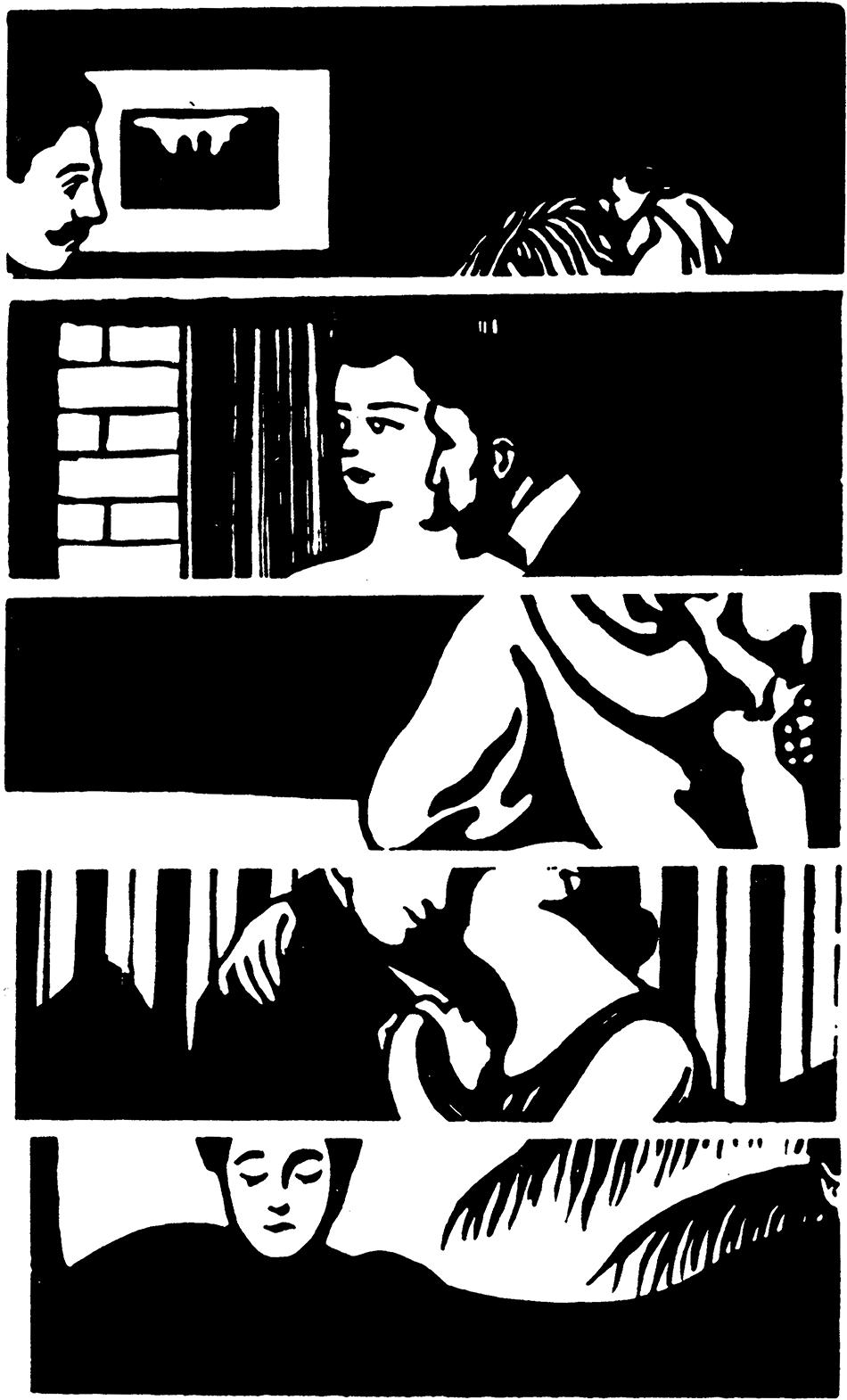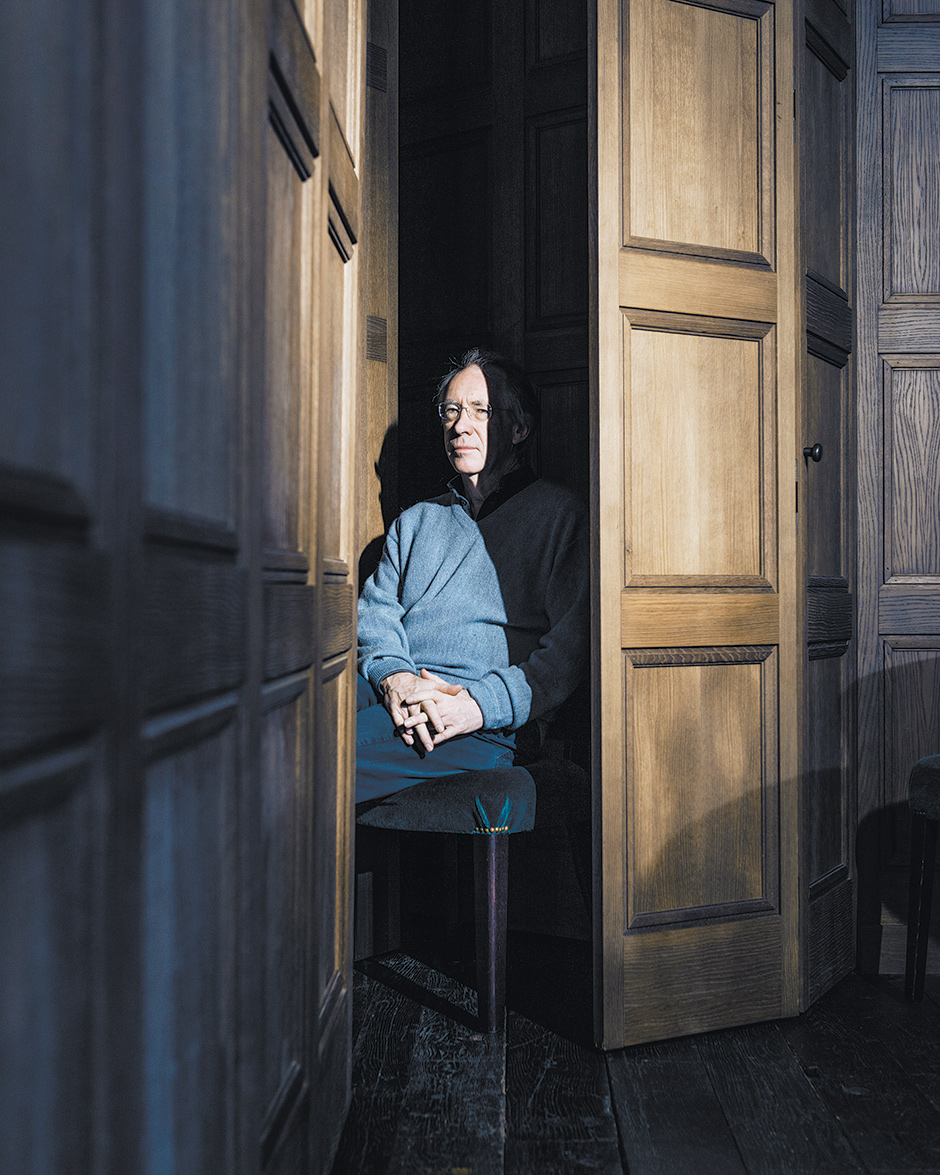This is Ian McEwan’s sixteenth book of fiction, by my count, and among the best and most accomplished novels he has ever written. His particular thread of success, it seems to me, has been to compose passages that burn a scar into memory, like star-shells on a flinching retina. In his earlier work, these were often scenes—moments, almost—of intense horror that the empathetic reader might spend years trying to forget. For example, the loss of a little daughter who vanishes in a supermarket, never to be found again (The Child in Time). Or the man clinging to the rope of a soaring balloon who knows that he will have to let go (Enduring Love).
These were coups: almost sadistically calculated stabs into the imagination. They were freeze-frame snapshots. But McEwan, his powers constantly developing in zigzag and unexpected ways, can now make a sustained stretch of narrative memorable in the same way, and—this is new—a character. Personalities in his fiction have often been a bit secondary, taking the shape they need to carry experiences. But in The Children Act, it’s Fiona Maye, a highly respected, middle-aged English judge in the “Family Division” that deals with marital disputes and custodies, who engraves herself in memory. Her small habits with coffee cups, or with the chaise longue onto which she subsides to read her briefs, are as vivid as this story of her search to be fair and kind and her unwilling self-discovery of hidden dreads and passions.
The Children Act is quite a short novel, and it’s hard to understand how it encloses so many themes so smoothly. Family law is here, and the bad things parents do to their children and to one another in the name of love. Growing older in a marriage is here, with the urge for a “last fling” either given a chance or (Fiona) nervously denied. The English legal establishment of the Temple and the Inns of Court is here in all its intellectual brilliance and snobbish arrogance, its triumphs of humane rationality set against its shocking reluctance to face miscarriages of its own justice. Rain is omnipresent, a drumming background from first page to last of remorseless English downpour, waterlogging every prospect of pleasure. And Fiona’s taste in music is constantly on stage, from Keith Jarrett’s Facing You to the Mahler that she plays in a Temple concert and Britten’s setting of Yeats’s “Down by the Salley Gardens”—a song that comes to play a fateful part in McEwan’s story.
There are two very different narratives running here, and without McEwan’s craft they might have come apart. One is about the law, or about the fearsome Solomonic judgments that sometimes have to be made in family cases. Nearly half the novel consist of Family Division trial scenes—one trial in particular—in which Fiona Maye (“My Lady” to the fawning barristers before her) hears the evidence of parents and their counsel and then gives her reasoned decision. The other narrative is about Fiona herself and her marriage.
The novel opens with Fiona on her chaise longue, trying to concentrate on the papers for next day’s hearing. Her husband of thirty-five years, Jack, has just told her that he intends to have an affair with a young statistician called Melanie—his final plunge into sensual ecstasy. “When did we last make love?” She can’t remember: “The crowded recent past can be difficult to recall.” But she refuses to tolerate this insulting proposal, and throws Jack out. Why should she consent to be obliterated by “a silent young woman with heavy amber beads and a taste for the kind of stilettos that could wreck an old oak floor”? That’s all we need to know about Melanie. Jack soon limps back, having evidently not found ecstasy in her bedroom, but Fiona at first finds it impossible to forgive him.
She is fifty-nine years old now, and the time for having children never seemed right. But her reputation among other judges is high. The Lord Chief Justice was heard to say of her: “Godly distance, devilish understanding, and still beautiful.” Fiona is what the Victorians would have called “stiff-necked,” with a growing tendency to self-righteousness that she knows she has to watch. “She believed she brought reasonableness to hopeless situations.” And indeed she does—in court.
England’s Children Act 1989 ordains that “when a court determines any question with respect to…the upbringing of a child…the child’s welfare shall be the court’s paramount consideration.” And what is welfare? Fiona has already won fame and respect for her judgment in a case of Siamese twins. Left alone, both babies will die. One could be saved if surgically separated at the price of the other’s life, but devout Catholic parents refuse to countenance “murder.” Fiona eventually directs that separation should take place on the seldom-invoked grounds of the “doctrine of necessity”—that “in certain limited circumstances, which no parliament would ever care to define, it was permissible to break the criminal law to prevent a greater evil.” Her judgment is thought “elegant and correct” by her colleagues. But hate mail follows, and nighttime visions of those twisted infant bodies put her off bodies in general—including Jack’s.
Advertisement
This is one of half a dozen accounts of such hearings in the novel—all absorbing, dramatic, and clearly based on real cases that McEwan has studied. As he acknowledges, he has talked at length to judges about the philosophical and moral dilemmas that can arise. But the words “to prevent a greater evil” have a wider relevance. McEwan writes increasingly about choices between bad and worse, about letting one twin die in order to save the other, about learning to accept and live with disappointment. Those who seek perfection and utter fulfillment usually come to grief, or—as in this story—to tragic destruction.
Fiona is enduring a pointless row with Jack when she’s relieved to be interrupted by an urgent call from her clerk. She’s all too conscious of the irony that she, bringing reason to so many desperate marital vendettas, is “now down there with the rest, swimming with the desolate tide.” But her clerk tells her of a new emergency. A seventeen-year-old boy, a few months short of the age at which he will be considered a free agent rather than a “child,” is dying of leukemia. A blood transfusion would save his life. But he and his parents are Jehovah’s Witnesses, and believe that God forbids transfusion of “alien” blood. The boy, Adam Henry, is prepared to die. But the hospital is applying for a court order allowing its surgeons to proceed against his and his parents’ wishes. Adam is deteriorating fast, and time is short.
Fiona hears the witnesses: the hospital consultant, the social worker acting as Adam’s guardian, the parents and their advocates. This trial scene, prolonged over many pages and utterly convincing for its lawyerly drama as much as for its arguments about rights over life and death, is really the centerpiece of The Children Act. Cases like this, counterposing the right to life to the rights of parents over children, religious certainty to medical ethics, will recur forever. Few weeks go by without such conflicts being reported in newspapers or on television. But it will always be worth going back to these pages, fiction as they are, for the clarity of their debate.
After the evidence, Fiona decides—on an uncharacteristic impulse—that she must confront Adam himself. She suspends the session and takes a taxi to a south London hospital. Here, sitting up in bed, she finds a brilliantly intelligent, attractive, funny, and yet touchingly unworldly boy. No question of persuading him to change his mind; he’s quicker-witted than she is. But she senses a pleading in him. Although time is running out, she lets him read her one of his poems and then play an air on his violin: “Down by the Salley Gardens.” Fiona has always been secretly proud of her voice, and now she finds herself singing the words to him: “She bid me take life easy, as the grass grows on the weirs;/But I was young and foolish, and now am full of tears.”
Back in the court, she gives her judgment. In this case, she bases it on the act’s criterion of “welfare” rather than on any question of whether this “child” fully understands the consequences of his refusal to accept the transfusion. Clearly he does. So
I have given due weight to A’s age, to the respect due to faith and to the dignity of the individual embedded in the right to refuse treatment. In my judgment, his life is more precious than his dignity. Consequently, I overrule the wishes of A and his parents….
She goes home, to fend off Jack’s attempts at a reconciliation and to deal with the next in the endless procession of miserable parents using their children as bargaining chips for money or self-justification. For Fiona, these are “routine wrangles.” But she reflects that
wealth mostly failed to bring extended happiness. Parents soon learned the new vocabulary and patient procedures of the law, and were dazed to find themselves in vicious combat with the one they once loved. And waiting offstage, boys and girls first-named in the court documents, troubled little Bens and Sarahs, huddling together while the gods above them fought to the last, from the Family Proceedings Court, to the High Court, to the Court of Appeal.
Fiona Maye, so well trained as a professional, cannot let her feelings about those Bens and Sarahs reach the surface. And yet “she buried deep in a private mental domain, but never let it affect her decisions, a puritan contempt for the men and women who pulled their families apart and persuaded themselves they were acting selflessly for the best.”
Advertisement
Many weeks after the Jehovah’s Witness case, when she has almost begun to forget its details, a letter arrives from Adam. He is healthy, growing stronger, about to return to school. But he is losing his faith. After the successful treatment, he writes with disgust, he found his parents weeping with joy at his bedside because he was alive—and because the guilt for allowing the sin of transfusion did not lie upon them. “Transfused, but not our fault!” Adam has moved the Bible out of his room and refuses to go to Witness meetings. But what he longs for is more of Fiona. “I think about you all the time and really want to see you and talk again.” He dreams of going around the world with her on a ship with adjoining cabins.
Reading this letter, she decides to write a cool, friendly reply. If she senses what is boiling up toward her here, she represses it. But she finds her reply too cool to be kind, and doesn’t send it. A few weeks later, another letter reaches her. “You don’t have to reply to this one either—which means I wish you would.” He feels that the top of his head has exploded. He has quarreled terminally with his parents. He feels jealous of Fiona’s other cases. And the wording of this letter suggests, reading between the lines, that he may be stalking her. Uneasy, Fiona sends the social worker to confirm that Adam is improving, doing well at school. No need to reply to this letter either, she concludes.

The ice is beginning to break in her own life, in the handsome old Grays Inn apartment where Jack has been sleeping in the spare room since his return. Delicately described by McEwan, there’s a drama of tiny, significant movements as, one morning, he makes coffee in the way—strong, with milk warmed but not hot—they used to enjoy together. No words are spoken. But “he turned with the raised cup only slightly extended toward her.” Then he pushes the cup toward her across the table, and “in slow motion” she picks it up and takes a sip. Their eyes meet. “A few silent seconds passed, and then it seemed that this was as far as they were prepared to go….” A thaw is starting but is clearly going to take a long time.
Fiona is due to go on circuit, to set out like a touring medieval monarch to visit distant provinces and deal out royal justice. Newcastle on Tyne, the first destination, is her favorite city. Here, as a teenager escaping from her oppressive mother to stay with her young northern cousins, she ran wild for the only time in her life, an adoring groupie with a rock band. Now “My Lady” from the High Court in London is greeted with deference and wafted by limousine to a luxurious country house, the traditional judge’s lodging. Complacent worthies sit down to dine with her. Outside, the rain swells to a tempest of wind and water.
Her clerk interrupts the dinner: a private matter. And the matter is Adam, drenched, shivering, and desperate, who has trailed her three hundred miles from London and then from Newcastle to the lodging. Why? Because, he eventually admits, he wants to be allowed to come and live with her. Full of concern and rational kindness (“kindness, the Family Division daily proved, was the essential human ingredient”), Fiona tells him that it’s quite impossible. Why, she and Jack only have one spare room, which is often used by nephews and nieces.
Incredulous, he asks if that’s her only objection. But Fiona has already discreetly sent for a taxi to take him away, and it’s now at the door. An overnight hotel in Newcastle and his return rail fare south will of course be discreetly paid for. He should text his mother and tell her where he was. Fiona has coped efficiently and humanely with everything—except what matters most: the force of his passion and her own stifled and unrecognized feelings.
The cab is waiting. Stunned and betrayed, Adam turns to leave. And then, disastrously, Fiona finds herself kissing him on the mouth. “You must go,” she repeats, and he goes. But for the next few days, the kiss obsesses her. Why? Typically, she masks her feelings under shallow terror for her career: did somebody see her in that “ludicrous and shameful transgression of professional ethics”? Perhaps she had been observed, but hadn’t noticed. And “even now, miles behind her in London, the case was being discussed.” Soon, “waiting for her back at Gray’s Inn, a formal letter from the Judicial Complaints investigation officer.”
On impulse, she telephones Jack, “running scared for the cover of a married woman of some repute, some solidity.” But back in London, nothing about her behavior, her moment of lost control, seems to have been noticed. Fiona and Jack resume their wary rapprochement with many checks and false starts. Both bury themselves in work; for her, this means the usual caseload in court, membership of two committees, piano practice for the imminent Christmas Revels concert.
Another letter arrives. It will be the last. It contains a poem of tormented religious imagery, in which a “Judas kiss” seems to be directed at Fiona. It ends in a handwritten tangle of words that she hasn’t time to decipher. Fiona is tempted to retort and justify herself. But then she tells herself that not to reply would be a “kindness.” Otherwise he would write again, turn up at her door again, have to be sent away again. Ignored, “he would soon move on.”
She is wrong about that. From this point, The Children Act moves toward its dreadful climax, reached against the background of the lawyers’ Christmas concert and the celestial music that soars in part from Fiona’s own hands.
Music, like the law itself, can be a striving toward heavenly order. But it’s this urgent sense of McEwan’s that such order is ultimately not attainable, and that the price of the striving can be mangled personalities whose “kindness” does not extend to themselves, that makes this novel so touching and so relevant to the stresses of a well-meaning age. Fiona wonders uneasily whether Bach’s music is not about “love in its vaguest, largest form” but about love for his own twenty children: “He didn’t let his work prevent him loving and teaching, caring and composing for those who survived.” Whereas this childless lady judge “belonged to the law as some women had once been brides of Christ.”
But like Jack, the law can be an unfaithful husband to its brides. Twice in this short novel, the narrative is interrupted by accounts of a gross miscarriage of criminal justice, each involving a judge or barrister who is a colleague of Fiona’s. (Both cases, I think, are McEwan’s fictionalized versions of notorious English trials from the last few years.) In one, a mother is convicted of murdering her two babies on grotesque “evidence” about the statistical odds against two cot deaths. Her first appeal is rejected: by the time she is freed as innocent, the mother is a wreck who drinks herself to death. In the second case, a drunken pub brawl among friends, a young man who merely threw two ineffectual punches is lumped into “joint enterprise” for “grievous bodily harm” by brutal, lazy prosecutors and sent to prison for years.
His barrister, a Queen’s Counsel and close friend of Fiona’s, tells her angrily that he’s had enough, he’s leaving the law. “Too sad, too stupid, too wasteful of young lives.” But she has heard him talk that way before; he won’t do it. And within a few hours of that talk, she herself will be struck down by the culmination of her relationship to Adam Henry. A dam inside her will break at last. But she too, the reader guesses, will eventually manage to round up her escaping passions and be again My Lady reigning “with godly distance” over the Family Division, the age lines around her mouth a little sharper than before.



